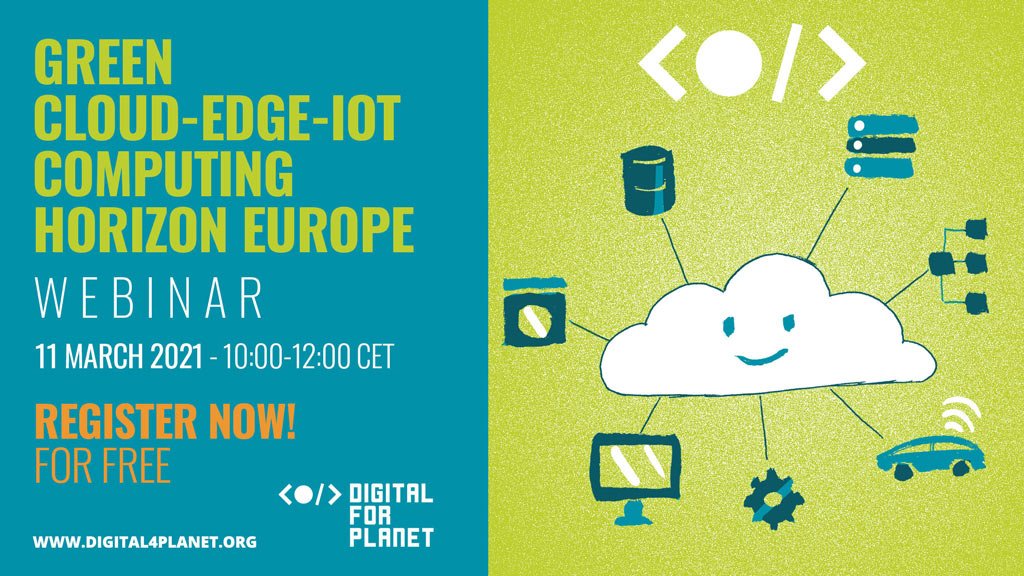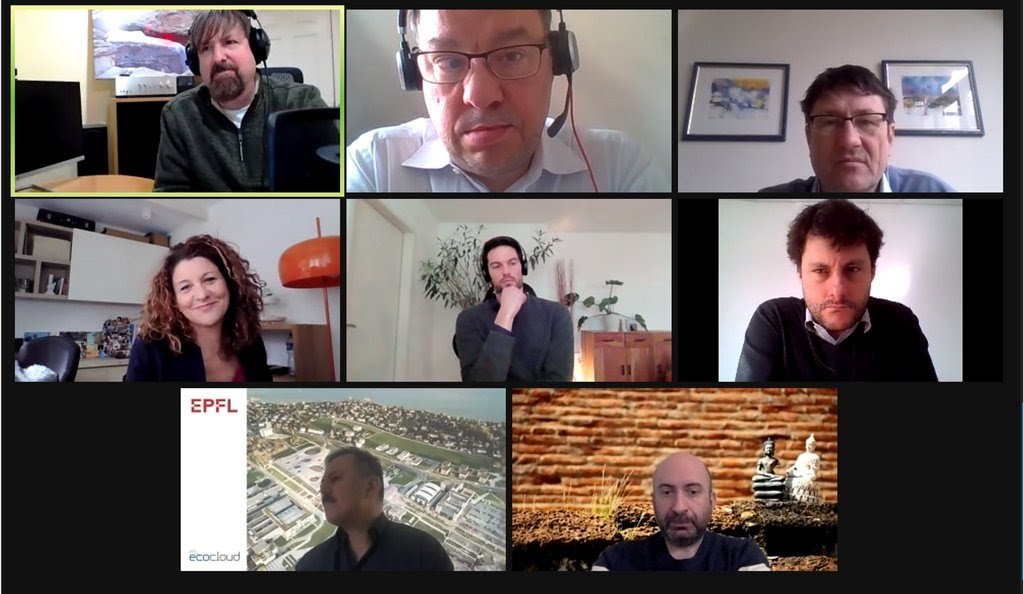Highlights from the Green Cloud-Edge-IoT Computing Horizon Europe Webinar
On 11th of March 2021, we organised the “Green Cloud-Edge-IoT Computing Horizon Europe” webinar. The purpose of the webinar was to gather top experts from the European Commission, to industry and academia to present and discuss how energy-efficiency technologies, mechanisms, and policies must be put in place at several levels to ensure the development of an eco-friendly cloud-edge-IoT-empowered market that is accessible to both public and private organisations. The main objective was to discuss and identify research and innovation challenges, as well as funding opportunities in view of the upcoming Horizon Europe Calls.
An introduction to Digital for Planet (D4P) was given by Dr. Monique Calisti, President D4P & CEO Martel Innovate. She mentioned that D4P is at work to design, develop & adopt sustainable digital technologies that empower people & organisations but also help protect the environment. Across several interesting points that were raised in her presentation, one that was reiterated multiple times during the webinar also by all other speakers was that without synergies across public, private and policy making bodies, without having a uniform agenda – it is not possible to make a significant difference in the path towards sustainability and climate neutrality. Monique also encouraged individuals to rethink their digital habits, as we all tend to overuse digital technologies, a practice that quickly becomes unsustainable.
In the next part, the guest speaker from the European Commission (EC), Dr. Bjorn-Soren Gigler, Senior Digital Innovation Officer, spoke at length about the multiple initiatives from the EC on digital sustainability topics. He mentioned the launch of European Green Digital Coalition, a pledge by the telecommunication companies for the greening of the ICT sector. He informed that multiple announcements will be made at the Digital Day 2021 with regard to upcoming calls and actions. Dr. Gigler added some highlights about the Digital Europe Programme (DEP), launched in January 2021, having a pot of EUR 7.5 Billion. This initiative focuses on digital transformation, prioritising topics such as cloud and edge computing, 5G, AI, and Blockchain. The DEP initiative also supports digital innovation hubs.
Dr. Gigler added about the Next Generation EU programme, that focuses on the recovery and resilience of the European economy. Under this plan, digital and green transition of economies are prioritized and are assigned a total of EUR 750 Billion in their funding budget. He also spoke about the EU SME Strategy that supports European SMEs by strengthening their capacities to adapt to climate neutrality challenges and reap the benefits of digitalisation, help reduce the regulatory burden that they face, and improve their opportunities to access finance. He also added that the EC directly invests equities into companies, via its European Innovation Council.
To conclude his informative talk, Dr. Gigler mentioned how digitalisation should be applied across all sectors of the economy. All sectors need to fundamentally and radically adopt sustainability in their agendas and not just the ICT industry. One of the biggest challenges he mentioned was the lack of standardised metrics and methodologies that can measure the ICT footprint on the environment.
In the next part of the webinar, a panel discussion between experts from Ericsson, EPFL, Qarnot, Borderstep Institute, Martel Innovate, and with Dr. Gigler representing the EC was held. The panelists discussed their take on the challenges in green digital transition as well as what their own teams are doing in this regard. For example, Mr. Rob Tiffany, VP & Head of IoT Strategy at Ericsson and Executive Director at MOAB Foundation, mentioned that at MOAB Foundation, they offer open source IoT technologies taking use cases from the United Nations Sustainable Development Goals and applying them to practice.
Nicolas Saintherant, Innovation Manager at Qarnot, mentioned the very interesting use case from Qarnot, an Edge computing oriented company. At the hardware level, Qarnot works with the utilization of heat generated by data centers. The waste heat from IT computations has low exergy, so it’s quite inefficient to try to transform it into other forms of energy or transport it over long distances, and it’s best used directly as heat in the place where it is produced. Therefore this low grade heat is a waste at source but of high value in other places, like for heating buildings. Qarnot explodes the datacenter into very small pieces that are installed directly where heat is necessary, as space heaters and water boilers in buildings. At the software level they are connecting cloud computing users in banks and 3D animation studios and distribute the computation tasks where heat is necessary with their own orchestrator.
Such an insight from the service provider was extremely useful to connect stakeholders. Mr. Saintherant emphasized the importance of digital sustainability awareness. When the market becomes more aware of the digital pollution, they will demand sustainable solutions, which then can be pushed by the solution providers and policy makers. He also mentioned the difficulties arising from a disconnect between organisations in different industries: regulations in ICT are lenient while regulations in buildings are extremely strict. And Qarnot being a bridge between these two sectors, they face big challenges in their operations.
Dr. Federico Facca, CTO Martel Innovate, added that the power usage index of small cloud providers and edge providers are unsustainable as their data centers are partially or completely not optimised, and they are usually not using renewable power sources. Therefore it was important to have subsidies to bring renewable and biodegradable technologies into the ecosystem, a point also reiterated by Prof. Babak Falsafi, Director EcoCloud at EPFL.
Prof. Falsafi also mentioned that in data centers, the overall sustainability depends as much on the efficiency of the running algorithm as from the sustainability of the underlying hardware and software. Even a small glitch in the algorithm might not render the system faulty but would still affect the computational and energy efficiency of the system.
In the final minutes of the webinar, Dr. Giovanni Rimassa, Vice President D4P & CIO Martel Innovate, introduced the Green Cloud-Edge-IoT Computing Working Group of D4P and invited experts and stakeholders to join the initiative towards a collective green digital transformation. He presented concrete activities planned by the D4P Green Cloud-Edge-IoT Computing Working Group, in preparation of upcoming Horizon Europe Calls.
Finally, Dr. Monique Calisti closed the webinar by sharing relevant Horizon Europe initiatives and inviting participants to join forces with Digital for Planet in its goal towards digital sustainability.
This webinar was a second, successful step along the series that we are organising to fire up the discussion and ideas exchange on the critical themes Europe and the world are facing on the road to sustainable and digital development. The message is clear, that we can only succeed together: join us to contribute through our Working Groups and put together strong teams and compelling proposals for Horizon Europe.
Presentations
Recording


